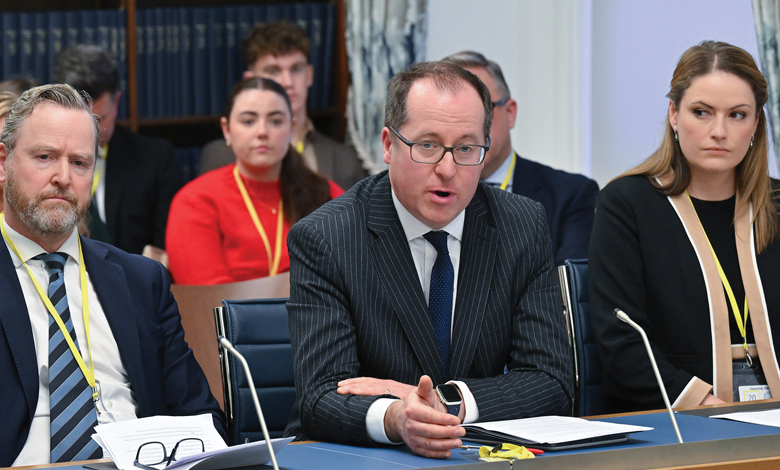The role of the independent referral Bar in a just and stable society

Chair of the Bar of Northern Ireland Donal Lunny KC began his two-year tenure in September 2024. The challenge faced by the new chair and his vice chair, Denise Kiley KC, in the short number of months since then could hardly have been more pronounced.
A Criminal Bar Association withdrawal of services which commenced in November 2024, and a legal challenge in respect of payment delays levied against legal professionals by the Legal Services Agency, reflected a deepening access to justice crisis.
Writing for agendaNi, Donal Lunny KC outlines that, while working to identify and assist in resolving the deep rooted problems in how justice is administered in this jurisdiction, the Bar of Northern Ireland must not lose sight of the bigger picture around protecting the independence of the referral Bar and the Bar of Northern Ireland’s core principles of access to justice, fairness, and the rule of law.
There can be no dispute that these are testing times for the administration of justice throughout Northern Ireland. Justice Minister Naomi Long MLA has been very frank in describing the arduous financial situation faced by the Department of Justice – and the Bar of Northern Ireland is not impervious to that. We are a long-standing advocate for an appropriately funded justice system and a positive, proud, and strategic vision for justice.
People must be able to access high quality legal representation to help them address challenging and unexpected life events, even if they cannot personally afford it. Legal aid is a vital demand led public service, just like health and education. It has been proven to have a beneficial social impact and, in addition, saves public expenditure in other areas and parts of government.
It is an irrefutable fact that justice has been underfunded historically, especially when it is compared to other Executive departments. Consistently over the last 10 years, the Department of Justice has been forced to manage from a meagre budget settlement, when compared with other departments.
From 2012/13 until 2022/23, the Justice Department’s overall expenditure has increased by just 3 per cent in cash terms; whilst education’s expenditure has increased by 32 per cent and health by 61 per cent in this same period. Furthermore, in terms of spend per head, justice is spending 2 per cent less in 2022/23 than it was in 2012/13, whilst education and health is spending 26 per cent and 54 per cent more, respectively.
Quite simply the state of our justice sector does not always rank highly in public consciousness, nor materialise as an influential issue for elected representatives when election years roll around. However, when people from all walks of life face serious life challenges such as relationship breakdown, housing crisis or personal injuries, or if they become victims of crime or are accused of a criminal offence, they expect and deserve effective and efficient access to justice.
Perhaps, the value of access to justice shines most brightly when we consider a world in its absence. We need only to look to our neighbouring jurisdictions to see the consequences of government policies which curtail access to justice. For example, the Legal Aid, Sentencing, and Punishment of Offenders Act (LASPO) came into effect in England and Wales in 2012 and its ramifications are still being felt by people attempting to access justice today.
LASPO cut large areas from legal aid, meaning that fewer people could access legal support, creating generational harm and displaced demand across communities. The number of civil legal aid providers in England and Wales dropped by more than 40 per cent in 10 years. In 2021, it was estimated that 3.6 million people in England and Wales had an unmet legal need each year.
“We are a long-standing advocate for an appropriately funded justice system and a positive, proud, and strategic vision for justice.”
Our policy and decision makers must learn the lessons of LASPO and avoid repeating the mistakes. As a post conflict society with stubbornly high levels of socio-economic deprivation and chronic rates of mental ill health, we in Northern Ireland must recognise that appropriate investment in our justice system leads to better outcomes across departments and assists in building a more competitive economy, delivering sustainable and inclusive growth, and contributing to continued peace building.
The Bar of Northern Ireland dedicates much effort towards elevating the importance of access to justice as a critical component of social welfare, akin to health and education. We provided a detailed submission to that effect during the draft Programme for Government (PfG) consultation.
I am pleased that we are playing a key role in the recently formed All-Party Group on Access to Justice where we participate in policy development in collaboration with our solicitor colleagues and other justice focussed civic society organisations. Informed citizenry is crucial to better decision making across government.
There are many issues beside the future of publicly funded legal services that the Bar Council must not just grapple with, but effect positive change on during my tenure as Chair. I want to advance efforts to promote a truly diverse Bar, reflective of the society we serve.
As Northern Ireland becomes more culturally diverse, so to must the barrister profession. We must also challenge policies and practices such as payment delay on the part of the Legal Services Agency, which disproportionately impact upon younger and female barristers and inhibits our efforts to retain talented practitioners and enhance socio-economic diversity.
Whilst there are many challenges ahead, the strength of the Bar lies in our collegiality, our independence, and our commitment to justice. If we remain faithful to those values, I am confident that the Bar of Northern Ireland will continue to serve the public by playing an important role in a stable, prosperous, and just society.
T: 028 9024 1523
W: www.barofni.com








